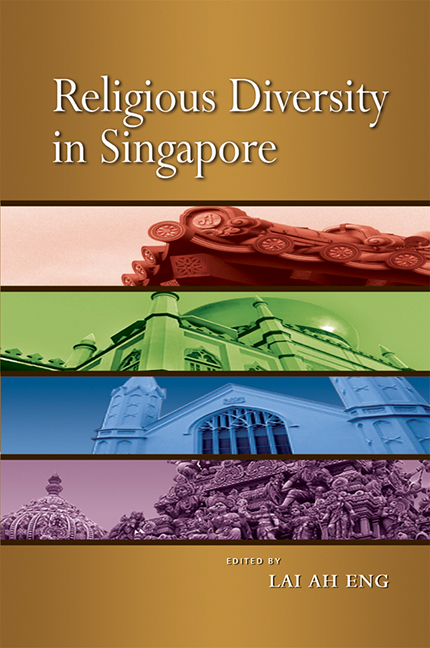Book contents
- Frontmatter
- Contents
- List of Figures and Tables
- List of Appendices
- FOREWORD
- PREFACE
- Acknowledgements
- The Contributors
- Abbreviations
- Glossary
- INTRODUCTION
- PART I The Landscape of Religious Diversity
- 1 Religious Influences and Impulses Impacting Singapore
- 2 Religious Trends and Issues in Singapore
- 3 Keeping God in Place: The Management of Religion in Singapore
- 4 Discourses on Islam in Southeast Asia and Their Impact on the Singapore Muslim Public
- 5 Global Christian Culture and the Antioch of Asia
- 6 “Religiously-inspired”, “India-derived” Movements in Singapore
- 7 Baha'is in Singapore: Patterns of Conversion
- 8 Diversities and Unities: Towards a Reformist Buddhism in Singapore
- 9 The Sathya Sai Baba Movement in Singapore: Its Service Mission and Philosophy of Communal Identity Construction
- 10 The Muslim Religious Elite of Singapore
- 11 The Evolution of the Sikh Identity in Singapore
- 12 Religious Processions: Urban Politics and Poetics
- PART II Religion in Schools and Among the Young
- PART III Religion in the Media
- PART IV Religious Organizations in Social Services
- PART V Interfaith Issues and Interaction
- Index
4 - Discourses on Islam in Southeast Asia and Their Impact on the Singapore Muslim Public
from PART I - The Landscape of Religious Diversity
Published online by Cambridge University Press: 21 October 2015
- Frontmatter
- Contents
- List of Figures and Tables
- List of Appendices
- FOREWORD
- PREFACE
- Acknowledgements
- The Contributors
- Abbreviations
- Glossary
- INTRODUCTION
- PART I The Landscape of Religious Diversity
- 1 Religious Influences and Impulses Impacting Singapore
- 2 Religious Trends and Issues in Singapore
- 3 Keeping God in Place: The Management of Religion in Singapore
- 4 Discourses on Islam in Southeast Asia and Their Impact on the Singapore Muslim Public
- 5 Global Christian Culture and the Antioch of Asia
- 6 “Religiously-inspired”, “India-derived” Movements in Singapore
- 7 Baha'is in Singapore: Patterns of Conversion
- 8 Diversities and Unities: Towards a Reformist Buddhism in Singapore
- 9 The Sathya Sai Baba Movement in Singapore: Its Service Mission and Philosophy of Communal Identity Construction
- 10 The Muslim Religious Elite of Singapore
- 11 The Evolution of the Sikh Identity in Singapore
- 12 Religious Processions: Urban Politics and Poetics
- PART II Religion in Schools and Among the Young
- PART III Religion in the Media
- PART IV Religious Organizations in Social Services
- PART V Interfaith Issues and Interaction
- Index
Summary
INTRODUCTION
This chapter highlights and evaluates the discourses on Islam that are found amongst the Singapore Muslim public. Understanding Islamic discourse in Singapore will be limited if one ignores the intellectual, cultural setting of the Muslim world of maritime Southeast Asia in which Singapore is geographically and culturally part of. In highlighting the types of discourses in the region, primarily in Malaysia and Indonesia, which exert some forms of influence on the local discourses on Islam, we are evaluating not only the types of discourse that are present and notably favoured, but also those that are absent and possibly not favoured. It is hoped that from this evaluation, we can reflect critically on some of the urgent and important issues in order to enhance the local discourses on Islam, bearing in mind the context and needs of the Singapore Muslim public.
Generally local discourse on Islam amongst the Muslim public covers a wide array of subjects and issues, including the following: (1) pietistic devotionalism where traditionalistic understanding of religion forms its core; (2) the debate on reformism versus traditionalism, whereby both compete for the claim of “authenticity”; (3) the call for public (read community) morality in which deviancy and especially juvenile delinquency has been of some concern; (4) the denouncement of secularism and humanism as Western imports which are deemed as undermining Islam; (5) the Islamizing trends in Muslim intellectual and cultural life; (6) the advocation of plurality, diversity and freedom; and (7) the denouncement of violence and radicalism. These discourses, though discussed and debated amongst the Muslim intelligentsia, inevitably have effects on the thinking of the general Muslim public. However, the (under)development of certain discourses, is conditioned not so much by their strength and viability, but by “gatekeepers” who determine the setting and tone of discourse on Islam locally. This in turn, determines the types and quality of the discourse on Islam in Singapore.
Recent Interest in and/or Fascination about Islam
In the post-September 11 era of anxiety over terrorism, we have witnessed a greater interest about Islam.
- Type
- Chapter
- Information
- Religious Diversity in Singapore , pp. 83 - 115Publisher: ISEAS–Yusof Ishak InstitutePrint publication year: 2008



